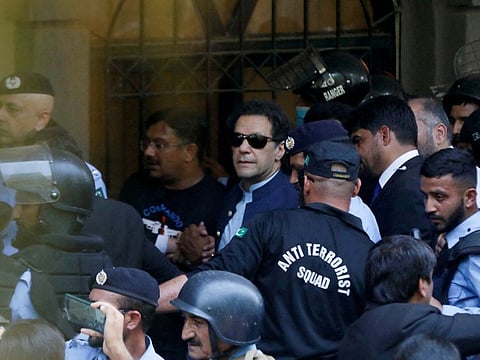Medical report declares ex-Pakistan PM Imran Khan alcoholic, drug abuser, rules out leg fracture: Minister
Report shows ‘presence of toxic elements and excessive usage of alcohol and cocaine’

Islamabad: Citing details of former prime minister Imran Khan’s medical report, Pakistan’s Health Minister Abdul Qadir Patel on Friday said the documents indicated excessive alcohol consumption, no information about a fracture on his leg, and unstable mental health, Geo News said.
These details, Patel told reporters in Karachi were from the medical report after the Pakistan Tehreek-e-Insaf (PTI) chief underwent an examination at PIMS Hospital following his arrest on May 9, referring to it as “public document”.
The report does not have any details about the fracture on his foot, which Khan claimed he sustained following the November 3 assassination bid.
“He [Imran Khan] had a plaster on his foot for about five to six months, however, the medical report did not indicate any fracture,” he added.
The PTI chief’s urine sample was also taken. He said that the initial report shows the presence of toxic elements and the excessive usage of alcohol and cocaine, Geo News said quoting the minister.
The report also mentioned about Khan’s mental health, according to which, his actions and body language are “not those of a fit man”.
“The report stated that a person with stable mental health does not make these kinds of gestures,” he said.
“I also used to say that Imran Khan’s mental condition is not well,” said Patel, adding that the PTI chief has ended decency in politics, political tolerance and respect for others.
Patel further said what Khan says contradicts his medical report, Geo News reported.
“Imran Khan’s report did not indicate any fracture, but [consumption of] powder,” he continued to say.
The health minister said that once the detailed report is out, it will be sent to the police.
“Whatever Khan is doing can only be done by an agent or a madman,” he said.
“A five-member panel of senior doctors is saying that his mental stability is questionable,” said Patel.
Speaking about the May 9 events, the minister said they hadn’t seen such situations since 1971, Geo News reported.
“We also had differences but we stood with the army when times were tough.”
33 protesters to go on trial in military courts
Thirty-three supporters of former Pakistan Prime Minister Imran Khan have been handed over to the army to face trial in military courts on charges of attacking armed forces’ installations, Interior Minister Rana Sanaullah said on Friday.
The 33 accused are among the thousands detained since Khan’s May 9 arrest sparked violent protests across Pakistan. Those handed over to army authorities are accused of trespassing on and vandalising sensitive military installations, Sanaullah said.
Khan was arrested on graft charges, which he denies. While he was subsequently released on bail, his confrontation with the country’s powerful generals has escalated.
The political unrest has worsened as Pakistan faces its worst economic crisis in decades. Inflation is at record highs, economic growth is anaemic, and there are fears that the country could default on external debts unless the International Monetary Fund unlocks delayed disbursements.
“The accused who are being handed over to the military are those who trespassed and entered very sensitive defence installations,” Sanaullah told a press conference in Islamabad.
He said that evidence suggested the protesters damaged or stole important equipment, computers and other sources of data collection.
He said only those involved in breaching out-of-bounds areas would face trial under army laws, suggesting there would not be mass trials in military courts.
But in response to a question, he also suggested that Khan could also be tried in a military court, saying: “as far as my own assessment and the evidence we have... this man is the architect of all this mess and planning, so yes he comes under this category.” Rights groups have raised concerns over military trials of civilians, saying they cannot ensure a fair trial. Such courts are closed to outsiders and the media.
The minister said after a verdict from the military courts the accused would have a right to appeal to a high court and then the Supreme Court.
Sign up for the Daily Briefing
Get the latest news and updates straight to your inbox



